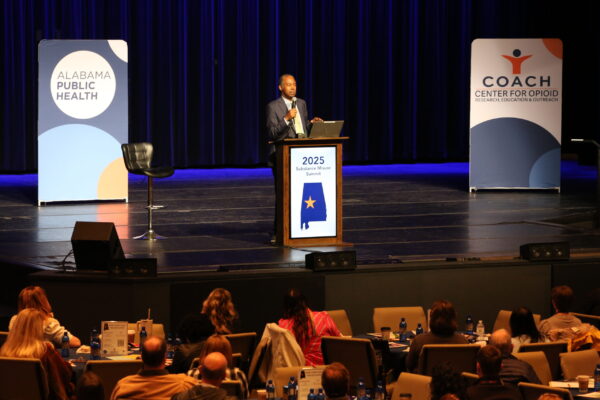As part of COACH’s commitment to education, faculty are working to provide health care professionals with the knowledge to prevent, recognize, and assist in treatment and referral for opioid use disorders within their practice and community. These educational programs bring together a diverse health care audience to encourage communication and collaboration across disciplines. Included in this work is an effort by Drs. Marlowe, Brent Fox, and Haley Phillippe, in partnership with the Alabama Department of Public Health to conduct a series of town hall meetings and summits across the state through the end of 2025 in reference to Alabama’s Prescription Drug Monitoring Program, or PDMP. The town halls consist of an interactive PDMP demonstration and skills-building exercise led by Auburn personnel with support from ADPH staff. The summit series is designed to focus broadly on drugs of concern. The role of the PDMP will remain a vital component of this summit series. As of January 31, 2025, 1,500+ individuals participated in training provided through this sponsored project. These programs are sponsored by the Alabama Department of Public Health through a parent grant funded by the Department of Justice, Bureau of Justice Assistance.
2026 Substance Misuse Summits
Join us for a full day of programming.
📅August 18, 2026 — Mobile, AL (The Grounds)
📅August 20, 2026 — Huntsville, AL (Jackson Center)
✅ Same programming at both locations
🕣 Check-in begins at 8:30 AM
✨ Featured speakers include Jep Robertson, Tom Farley, and Laura Stack, among others.
🔗 Register today:
Mobile ➡️ https://cmetracker.net/USAL/Publisher?page=pubOpen#/EventID/124247/
Huntsville ➡️ https://cmetracker.net/USAL/Publisher?page=pubOpen#/EventID/124248/
Questions? Email coach@auburn.edu
2025 Summit Recap
Our 2025 Substance Misuse Summit held on January 14, 2025, in Montgomery may have been the best version of this event to date! This year’s at-capacity Summit event was bigger and better, with many more seats and an incredible slate of speakers! Keynote speaker Dr. Ben Carson offered his words of inspiration and wisdom to attendees, along with a follow-up Q&A session. A number of speakers and presenters made yesterday’s event stand out, including Ben Spellman, who gave a sincere presentation about overcoming his personal struggle with drug dependency. Kevin DeStefano, of the U.S. Drug Enforcement Administration, gave an interesting and informative overview of current controlled substance trends. Several state officials gave a “State of the State” address, including Dr. Scott Harris, Alabama Department of Health State Health Officer, Kim Boswell, Alabama Department of Mental Health Commissioner and Clay Crenshaw, Chief Deputy Attorney General. State Rep. Joe Lovvorn, Dist. 79, gave a presentation about the Price Hornsby act, and Dr. Garrett Aikens discussed the Prescription Drug Monitoring Program. Dr. Cherry Jackson gave a presentation about co-occurring mental health and substance use disorders. Auburn University Harrison College of Pharmacy’s Center for Opioid Research, Education, and Outreach (COACH) was pleased to partner with the Alabama Department of Public Health and the University of South Alabama Office of CME to host this interdisciplinary summit.
Continuing Education Home Study
We are happy to share a free home study on Alabama’s Prescription Drug Monitoring Program. This presentation is a review of the history and laws pertaining to the Alabama PDMP; it provides information to pharmacists and pharmacy technicians needed to successfully submit prescription information to the Alabama PDMP and enhances community pharmacists’ understanding and utilization of the Alabama PDMP.
This CE is for pharmacists and pharmacy technicians and is 1.25 hours of continuing education credit.
Alabama’s Prescription Drug Monitoring Program: The Essentials



These projects are supported by the Alabama Department of Public Health through a grant from the Bureau of Justice Assistance. The Bureau of Justice Assistance is a component of the Department of Justice’s Office of Justice Programs, which also includes the Bureau of Justice Statistics, the National Institute of Justice, the Office of Juvenile Justice and Delinquency Prevention, the Office for Victims of Crime, and the SMART Office. Points of view or opinions in this document are those of the author and do not necessarily represent the official position or policies of the U.S. Department of Justice.





